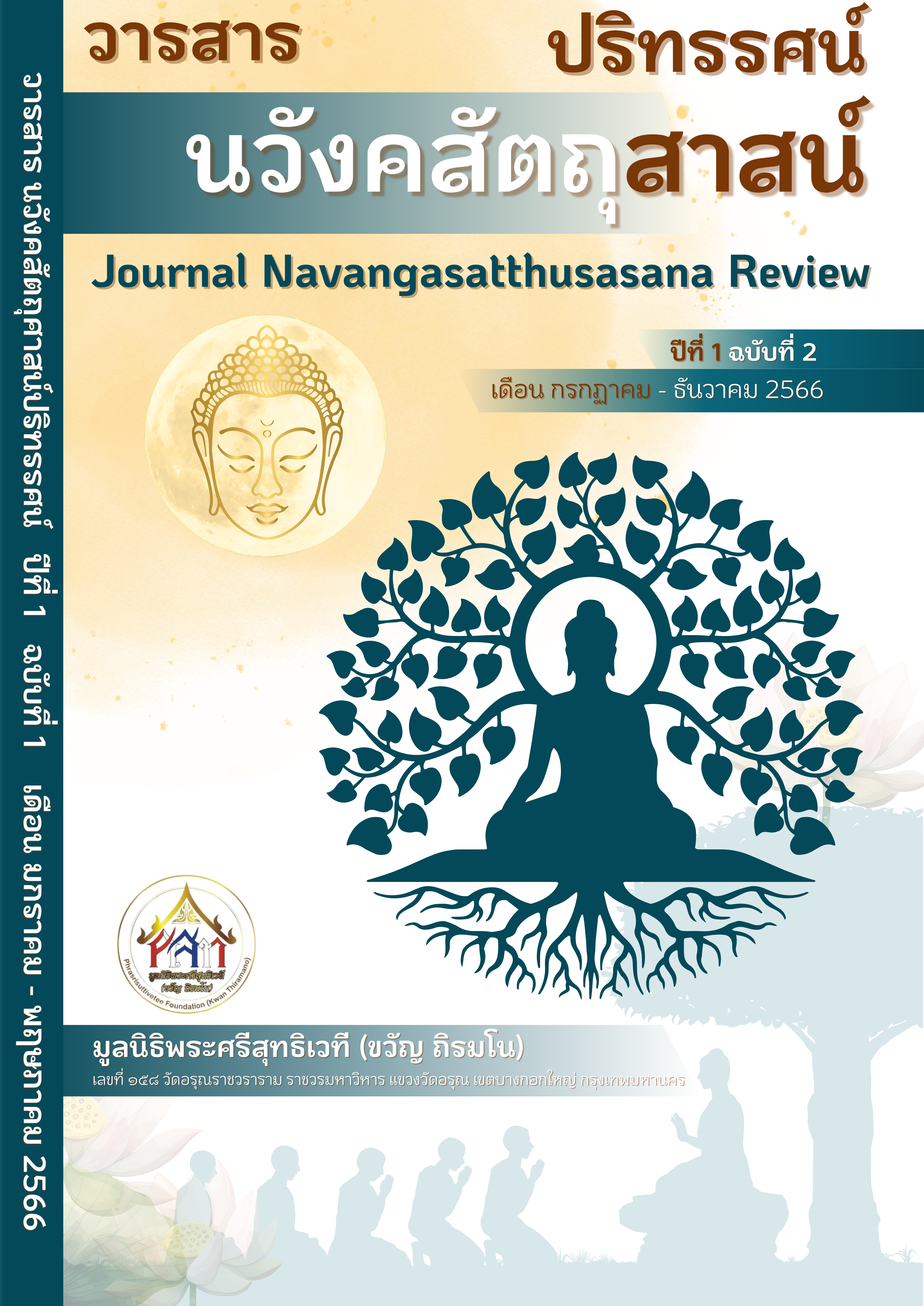สติสัมปชัญญะที่ใช้ประโยชน์ในชีวิตประจำวัน Consciousness that is useful in everyday life
Main Article Content
Abstract
This academic article aims to demonstrate that the fundamental principle underpinning all other principles is mindfulness. By cultivating constant awareness and self-observation, one can regulate their actions to foster personal development, living in the present moment, observing the body as it functions, and observing the mind as it works. Mindfulness is the awareness that precedes actions, words, and thoughts, promoting thoughtful deliberation in all endeavors. The lack of mindfulness leads to harmful consequences such as frustration, which can contribute to mental health issues like psychosis and neurosis. Moreover, it can be a root cause of physical illnesses originating from mental stress. Humans need to maintain constant mindfulness in every moment, aware of their actions, recognizing the benefits and outcomes of their actions, and carrying out tasks with care and patience. When encountering problems, one should reflect on the cause and then seek a solution. Living without mindfulness significantly increases the risk of problems, as individuals may not be aware of their actions or have a sense of right and wrong, potentially leading to a careless life. Therefore, it is essential to establish reminders to pause and prevent excessive actions. Mindfulness can adapt one's life and mind to suit any situation in daily life.
Article Details

This work is licensed under a Creative Commons Attribution-NonCommercial-NoDerivatives 4.0 International License.
The content and information in articles published in Navangkasatthasāsana Review represent solely the opinions and responsibility of the authors. The editorial board of the journal is not required to agree with, nor does it share responsibility for, any part of the articles.
All articles, data, content, images, and other materials published in Navangkasatthasāsana Review are the copyright of the journal. Any individual or organization wishing to reproduce, distribute, or otherwise use all or any part of such materials must obtain prior written permission from Navangkasatthasāsana Review.
References
ชลลดา ทองทวี. และคณะ รายงานผลโครงการวิจัยและจัดการความรู้จิตตปัญญาศึกษา. สำนักงานกองทุนสนับสนุนการสร้างเสริมสุขภาพกรุงเทพมหานคร: ศูนย์จิตตปัญญาศึกษา มหาวิทยาลัยมหิดล, 2551.
พระธรรมกิตติวงศ(ทองดี สุรเตโช) . พจนานุกรมเพื่อการศึกษาพุทธศาสนชุดคําวัด .พิมพ์ครั้งที่ 3.กรุงเทพมหานคร:สำนักพิมพสถาบันบันลือธรรม, 2548.
พระมหาสว่าง จตฺตมโล (ถุนกระโทก).“การศึกษาเจตคติ และความเข้าใจเกี่ยวกับเบญจกัลยาณธรรมในพระพุทธศาสนา ศึกษาเฉพาะกรณี : ชุมชนวัดโพธิ์เรียง เขตบางกอกน้อย กรุงเทพมหานคร” , วารสารรัฐศาสตร์มหาวิทยาลัยราชภัฏสวนสุนันทา.ปีที่ 4 ฉบับที่ 2 (กรกฎาคม-ธันวาคม 2564).
พระโพธิญาณเถระ (ชาสุภทฺโท). อุปลมณี. กรุงเทพมหานคร: โรงพิมพ์คุรุสภา, 2553.
พุทธทาส อินฺทปญฺโญ. โพธิปักขิยธรรมประยุกต์.พิมพ์ครั้งที่ 69.สุราษฎร์ธานี:ธรรมทานมูลนิธิ
สวน โมกข์ไชยา, 2545.
พุทธทาสภิกขุ. สติ. พิมพ์ครั้งที่2. กรุงเทพมหานคร: จักรานุกุลการพิมพ์, 2528.
พระสุภกิจ สุปญฺโญ . “การประยุกต์ใช้สติสัมปชัญญะสำหรับการใช้ชีวิตประจำวัน”วารสารรัฐศาสตร์ มหาวิทยาลัยราชภัฏสวนสุนันทา.ปีที่ 4 ฉบับที่ 2 (กรกฎาคม-ธันวาคม2564): 106.
พันตำรวจเอก (พิเศษ) บุญเพ็ญ แขวัฒนะ.กฎแห่งธรรมชาติ:คุณค่าของสติ.[ออนไลน์].
แหล่งที่มา::http://www.tong9.com/main/index.php/menu1/menu18/menu19.
สิงหาคม 2565].
มหาจุฬาลงกรณราชวิทยาลัย. พระไตรปิฎกภาษาไทย ฉบับมหาจุฬาลงกรณราชวิทยาลัย. กรุงเทพมหานคร: โรงพิมพ์มหาจุฬาลงกรณราชวิทยาลัย, 2539.
สมเด็จพระมหาสมณเจ้ากรมพระยาวชิรญาณวโรรส.บาลีไวยากรณ์. กรุงเทพมหานคร: โรงพิมพ์ มหาจุฬาลงกรณราชวิทยาลัย, 2542.
สมเด็จพระอริยวงศาคตญาณ สมเด็จพระสังฆราช (จวน อุฎฺฐายีมหาเถระ). มงคลในพระพุทธศาสนา.
พิมพ์ครั้งที่ 7. กรุงเทพมหานคร: โรงพิมพ์กิตติวรรณ, 2538.


